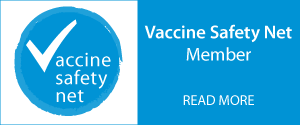
WE PROMOTE AND IMPROVE VACCINE SAFETY
For more than 20 years, our global community of vaccine safety experts has established standardized, validated, and objective methods to support the development of safe vaccines.
MISSION
We enhance the science of vaccine research by providing standardized, validated, and objective methods for monitoring safety profiles and benefit-to-risk ratios of vaccines.
VISION
We envision the safest, most effective vaccines based on rigorous science.
STRATEGY
We bring together committed stakeholders, protect scientific independence, facilitate knowledge transfer across different sectors, locations, and professions, and support vaccine safety experts.
Our Priorities
1. Setting standards
Our case definitions, guidelines and protocols intend to enhance data comparability within and across clinical trials, surveillance systems, and post-licensure clinical studies.
2. Clinical assessment
We leverage our community’s expertise for rapid information exchange.
3. Data sharing
We promote the conduct of international collaborative observational studies.
4. Public confidence
We harmonize and develop new methods for public and social media monitoring and share information about emerging misinformation.
5. Capacity building
We enhance local vaccine safety expertise through collaborative projects and knowledge transfer.

History
- CEPI and Brighton Collaboration launched SPEAC 2.0 in November 2022 to align SPEAC’s work with CEPI’s new 100 Days Mission to dramatically reduce the time it takes to deliver a vaccine against a pandemic pathogen. SPEAC 2.0 continues the project’s original work in DSMB and scientific coordination for Disease/AESI X while also supporting outreach to low- and middle-income countries and facilitating rapid response.
- The US Centers for Disease Control and Prevention (CDC) funds the CARESAFE project within COVID-19 Vaccine Introduction Program (COVIP) for low- and middle-income countries (LMIC) to pilot several approaches to strengthen their capacity for pharmacovigilance of COVID-19 vaccine and adverse events following immunization (AEFI)/if special interest (AESI).”
- The World Health Organization (WHO) Global Advisory Committee on Vaccine Safety (GACVS) recommended that “any review of the safety of new vaccines be based on the appropriate Brighton Collaboration standardized templates for benefit–risk assessment of vaccines (by technology platforms) when available and approved, which offer a structured approach to evaluating safety”.
- The World Health Organization (WHO) Global Advisory Committee on Vaccine Safety (GACVS) recommended that “any review of the safety of additional vector-based Ebola virus vaccines should be based on the Brighton Collaboration vector template, as it offers a structured approach to evaluating safety”.
- The Coalition for Epidemic Preparedness Innovations (CEPI) and the Brighton Collaboration launch the Safety Platform for Emergency vACcines (SPEAC) Project.
- The Brighton Collaboration has been dissolved as a Partnership under Swiss law and reconstituted as a programme of the Task Force for Global Health (TFGH; www.taskforce.org).
- Relaunch of the new Brighton Collaboration Website and the Virtual Institute ACADEMY.
- The Brighton Collaboration Foundation signs a Memorandum of Understanding with Taiwan Centers for Disease Control.
- The Brighton Collaboration Foundation and the Hochschule Hannover launched an internship project. Three students (BA Medical Information Management) were hosted successfully.
- The GAIA project has been completed successfully and the Bill & Melinda Gates Foundation has provided funding for a project extension (GAIA Phase II).
- Clinical Advisory Forum of Experts (CAFE) is launched as a real-time exchange platform for vaccine safety professionals worldwide.
- Templates for documenting the safety of Viral Vector Vaccines created.
- Brighton Collaboration Online Journal Club formalised to promote open and transparent scientific debate of current issues in vaccine safety.
- Brighton Collaboration instrumental in building ADVANCE consortium.
- The Vaccine Safety Quarterly provides news and information from the volunteering Brighton Collaboration network and reaches over 4000 members of the Brighton Collaboration.
- Vaccine.GRID established as independent foundation and dedicated platform for the conduct of large-scale international observational vaccine safety and benefit-risk studies.
- International symposium on innovations in vaccine safety monitoring in Shanghai.
- Centers for Disease Control and Prevention (CDC) request worldwide study on narcolepsy (SOMNIA).
- The Brighton Foundation US is registered in Boston, Massachusetts as a public charity and associated partner to the Brighton Collaboration Foundation, Switzerland.
- First ever international risk assessment study based on one protocol and one data sharing infrastructure published based on over 30 Million population: Guillain-Barre Syndrome following pandemic influenza H1N1 vaccine.
- First ever international background rate studies based on one protocol and one data sharing infrastructure: A dozen adverse events of special interest based on over 260 Million person years.
- World Health Organization (WHO) vaccine safety strategy (Vaccine Safety Blueprint) published. Brighton Collaboration was development partner.
- Brighton Collaboration contributes to World Health Organization (WHO) Global Vaccine Safety Landscape Analysis.
- 2009 Pilot of European Vaccine Safety Data Network launched on request of ECDC.
- General guidelines for the collection, analysis, and publication of vaccine safety data in surveillance systems and clinical trials.
- Official launch meeting of the Brighton Collaboration in Verona. Kathrin Kohl, Centers for Disease Control and Prevention (CDC), and Jan Bonhoeffer, University Children’s Hospital Basel (UKBB) were appointed to build an international network and coordinate activities.
- WHO joins as observer and funding agency.


